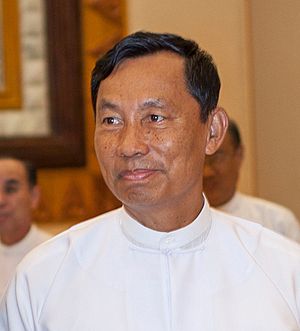The removal of parliamentary speaker Shwe Mann as leader of the ruling Union Solidarity and Development Party (USDP) aims to smooth rising ructions inside Myanmar’s military establishment ahead of pivotal parliamentary elections scheduled for November 8.
Shwe Mann was poised to run for president on the military-backed party’s ticket and was tipped by many analysts to lead a potential coalition “unity” government with the opposition National League for Democracy (NLD) if, as likely, neither wins an outright majority at the polls.
Instead, his fall will open the way for incumbent President Thein Sein to seek another term as nominal national leader and diminish the chances of any political union with the Aung San Suu Kyi-led NLD. Ahead of the purge, Thein Sein was coy about his political intentions in a July 29 Nikkei Asian Review interview, where the ex-general stated his intention to continue reforms but would not confirm if he planned to contest the presidency. He said he would decide based on “the country’s situation, the prevailing circumstances, and wishes of the people.”
The prevailing circumstances have since shifted dramatically. Shwe Mann and party secretary general Maung Maung Thein were removed from their posts at a Wednesday evening meeting at the USDP’s Naypyidaw headquarters, according to news reports. USDP vice-chairman Htay Oo, a Thein Sein ally, led the meeting at which he assumed the party’s chairmanship; Tin Naing Thein, one of Thein Sein’s trusted aides, resigned as president’s office minister to become secretary general, the reports said. It was not clear if Shwe Mann was also ousted as parliament speaker, though if history is a guide his placement into virtual house arrest augurs ill for his political future.
The late night purge unfolded after troops and police forces surrounded the party headquarters and forbade anyone from leaving the premises, according to reports. The deployment of troops to enforce the power play signaled that military commander Senior General Min Aung Hlaing supported the move. It has also spurred speculation among analysts that Senior General Than Shwe, the previous junta’s long-time leader, an ex-director of psychological warfare, and architect of previous intra-military purges, may have played a role from behind-the-scenes.
Shwe Mann was the third highest ranking official in Than Shwe’s iron-fisted junta and for a time was viewed as his preferred successor. However, Shwe Mann’s 2011 election as speaker of parliament’s lower house, perceived at the time as a more symbolic than powerful post, seemed to intentionally put him in divide-and-rule competition with Thein Sein for supremacy in Than Shwe’s carefully scripted transition to quasi-civilian rule. Than Shwe retired from politics upon the handover but remains highly influential, particularly among the armed forces, political analysts say.
Shwe Mann and Thein Sein’s personal rivalry created the intra-governmental tension needed to convince the U.S. and Europe that check-and-balance democracy was taking root after nearly five decades of unaccountable military rule. (Shwe Mann famously criticized Thein Sein’s government for a “lack of transparency” in May.) Perceptions of reform, combined with an easing of media censorship and mass release of political prisoners, were pivotal to the decisions in Washington and European capitals to suspend or lift economic and financial sanctions that for decades had crippled Myanmar’s economy.
Yet Shwe Mann’s ambition for the presidency, witnessed in his open overtures towards Suu Kyi and the NLD, likely sowed the seeds of his own demise. Political tensions ran high earlier on Wednesday when only 59 of 159 senior officers who retired from the armed services specifically to run in the election on the USDP’s ticket were selected as candidates, according to news reports. As party chairman, Shwe Mann would have necessarily signed off on the list. Soldiers with ties to Thein Sein were believed to represent a majority of those who were overlooked.
There were already signs of intra-party friction. A petition circulated and signed by over 1,700 people in Shwe Mann’s home constituency calling for his impeachment for not “respecting” the military’s role in parliament signaled certain top brass had already moved against him. The 2008 constitution reserves 25 percent of parliament’s seats for military members, giving the armed forces an effective veto over proposed constitutional amendments that must receive over 75 percent share of ballots then pass a national referendum to become law.
In June, the NLD’s attempt to amend the percentage vote requirement for charter change from over 75 percent to 70 percent was rejected by the military’s voting bloc. So, too, was a proposed amendment to scrap the legal ban on anyone whose spouse or children are foreign nationals from becoming president. Suu Kyi’s late husband and two sons are British citizens, barring the 70-year-old former political prisoner and daughter of a national independence hero from seeking executive office. While both measures were voted down, Shwe Mann’s agreement to allow for a three-day debate put parliament’s military representatives in the hot seat.
It was not clear at the time of writing whether Shwe Mann had been accused or charged of any crime. Past high-level purges in Myanmar, including the 2004 dismissal and imprisonment of intelligence chief and prime minister General Khin Nyunt, were often justified on grounds of corruption but staged to clip the wings of ascendant officers who threaten the status quo. If senior leaders are intent on Shwe Mann’s demise, they will likely target his two sons’ business interests in telecommunications, trading, and construction as having benefited from their father’s political clout, as alleged in a U.S. diplomatic cable published by WikiLeaks. Either way, Shwe Mann’s loss will be Thein Sein’s and his military backers’ gain.

































